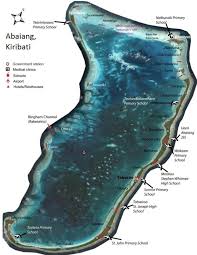Exploring the Unique Island Nation of Kiribati

Introduction
Kiribati, an island nation located in the Central Pacific, is comprised of 33 atolls and reef islands, scattered over a vast area of ocean. With a population of approximately 119,000, Kiribati is notable for its rich culture and its status as one of the first countries to face the direct consequences of climate change. The importance of Kiribati extends beyond its geographical size; it represents a case study of the impacts of rising sea levels and environmental sustainability.
The Geography and Culture of Kiribati
The nation consists of three island groups—Gilbert Islands, Line Islands, and Phoenix Islands. These islands are characterised by their stunning natural beauty, with sandy beaches and vibrant marine life that attracts eco-tourism. The culture of Kiribati is a blend of traditional customs and modern influences, with community events such as the annual Te Mire tibi, a celebration featuring traditional dances and songs, showcasing the islands’ rich heritage.
Climate Change Challenges
However, the very beauty of Kiribati is threatened by climate change. Rising sea levels have already begun to erode coastlines, leading to the loss of land and fresh water sources. Recent data from the Intergovernmental Panel on Climate Change (IPCC) suggests that the impact of climate change could render parts of Kiribati uninhabitable in the coming decades, prompting urgent discussions about migration and the future of its people. In 2023, President Taneti Maamau announced new initiatives aimed at sustainability, including partnerships to enhance food security and climate resilience.
International Response and Future Prospects
The challenges faced by Kiribati have gained increased international attention, leading to collaborations with various organisations focused on climate adaptation. The nation’s unique situation highlights the need for global solidarity in combating climate change. Over the past year, Kiribati has received support through various UN programmes aimed at capacity building and enhancing environmental management.
Conclusion
In conclusion, Kiribati serves as a significant indicator of the challenges that small island nations face in the context of global climate changes. The efforts made by the government to combat and adapt to these challenges are vital not only for the people of Kiribati but also as a model for other vulnerable regions. As Kiribati continues to navigate these uncharted waters, it stands as a reminder of the urgent necessity for global action in addressing climate change and promoting sustainable development.






